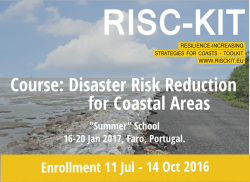Second RISC-KIT “Summer” School Open for Enrollment.

The course will focus on two of the five tools being developed as part of the EU-funded RISC-KIT project. The first of these tools, the Hotspot tool, consists of an early-warning system combined with a decision support system that allows users to look at particularly vulnerable areas of the coastline. Through probabilistic methods, a Bayesian model allows users to predict the potential impact of a storm event based on climatic conditions as they unfold on the ground. It also provides probabilities of different outcomes based on a range of potential management decisions, in the context of real-time storm conditions. The second tool, the multi-criteria analysis tool, allows users to include qualitative factors in their evaluation of alternative management approaches. It allows the inclusion of factors such as local values, human behaviour and opinions.
This course will focus on the modelling and computational elements underlying these RISC-KIT tools. Students will be taught how to set up and use Bayesian neural networks to predict decision outcomes and how to incorporate qualitative measure into disaster risk reduction strategies. PhD students, who have finished at least one year of study, and postdocs are invited to apply; the course is directed at those with a background in: physics, mathematics, oceanography, coastal dynamics, coastal engineering, flood risk and statistics. Basic knowledge on Matlab and programming is required. Experience with XBeach is preferred, but not necessary. Participation in the first Summer School (Ferrara, Italy, September 2016) is not a prerequisite for joining the training course in Portugal.
The second RISC-KIT “Summer” School will take place at the University of the Algarve, Faro, Portugal, from 16 – 20 January 2017. It will comprise theoretical and practical components as well as a field trip to Praia de Faro, part of the RISC-KIT study site, Ria Formosa, Algarve. The course will be given by experts including Drs. Oscar Ferreira and Haris Plomaritis, University of the Algarve; Drs. Robert McCall, Kees Nederhoff, Ap van Dongeren, Deltares; Dr. Karina Barquet, SEI International; Dr. Wiebke Jäger, TU-Delft; and Dr. Dano Roelvink, UNESCO-LHE.
Enrollment for the “Summer” School will remain open until 14 October 2016. Interested candidates are asked to send a Curriculum vitae, together with a letter of motivation to summer.schools@risckit.eu. Places are limited and will be offered to the candidates who rank highest during the evaluation process. Please see www.risckit.eu for further information and updates.
Keywords
Disaster Risk Reduction, Preparedness, Mitigation, Coastal flooding


